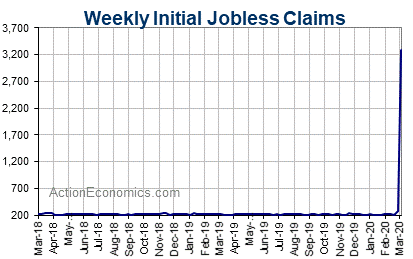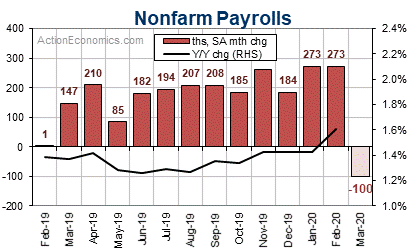The historic 3,001k surge in initial claims last week, to an unprecedented 3,283k in the week after the BLS survey, when mandatory closures began, suggests that the bulk of job market disruptions from COVID-19 will be seen in the April rather than March establishment survey.

The 4-week average for initial claims has a strong inverse relationship with the monthly payroll gain. Until the massive claims surge caused by COVID-19, claims had been surprisingly tight relative to the rate of job growth, presumably due to reduced job churn in the latter half of this expansion. This relationship will take a wild ride over the coming months, as we see whether it is claims or payrolls that exhibit the bigger gyration.
Hence for March, the US nonfarm payroll is unlikely to show any sign of pandemic affection, while they are expected to come out at a -100k March drop, as the survey captures the beginning of the labor market hit from COVID-19. The jobless rate is expected to rise to 3.8% from 3.5%, and we assume that some participants will report a big workweek drop, leaving a -1.5% plunge in hours-worked.
Weakness in the available consumer and producer sentiment reports, and early anecdotal reports on vehicle sales, also suggest the start of a jobs downdraft by mid-March.

The -100k nonfarm payroll forecast assumes a -157k private jobs decrease. Goods based employment should fall by -5k in March after a 61k bounce in February. Construction employment is seen adding 15k, after a 42k pop in February and an even stronger 49k increase in January, while factory jobs should be down -20k, after a 15k February increase and a -20k decrease in January. Private service jobs should decline -152k in March, after a 167k gain in February.
Meanwhile, the average hourly earnings which is a key element of Friday’s US slot, is expected to post a 0.3% increase in March, after gains of 0.3% in February, 0.2% in January, and 0.1% in December. Growth in hourly earnings is gradually climbing from the 2% trough area between 2010 and 2014. Job losses will be skewed toward lower paid retail and leisure and hospitality workers and this will put upward pressure on average hourly earnings, though this boost should be more evident in the April report than the March report.
Click here to access the HotForex Economic Calendar
Andria Pichidi
Market Analyst
Disclaimer: This material is provided as a general marketing communication for information purposes only and does not constitute an independent investment research. Nothing in this communication contains, or should be considered as containing, an investment advice or an investment recommendation or a solicitation for the purpose of buying or selling of any financial instrument. All information provided is gathered from reputable sources and any information containing an indication of past performance is not a guarantee or reliable indicator of future performance. Users acknowledge that any investment in Leveraged Products is characterized by a certain degree of uncertainty and that any investment of this nature involves a high level of risk for which the users are solely responsible and liable. We assume no liability for any loss arising from any investment made based on the information provided in this communication. This communication must not be reproduced or further distributed without our prior written permission.



















